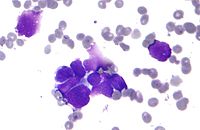
Photo from wikipedia
Background/Aim: Programmed death ligand-1 (PD-L1) and programmed death protein 1 (PD-1) expression levels in many tumors and their correlation with prognosis have been actively studied. However, studies on PD-1 expression… Click to show full abstract
Background/Aim: Programmed death ligand-1 (PD-L1) and programmed death protein 1 (PD-1) expression levels in many tumors and their correlation with prognosis have been actively studied. However, studies on PD-1 expression and its prognostic value in clear cell renal cell carcinoma (ccRCC) are limited and controversial. In this study, we describe the expression of PD-1 and its prognostic significance and association with clinical features in patients with ccRCC. Materials and Methods: We obtained clinicopathological data from 166 patients with ccRCC who were treated at Gyeongsang National University Hospital, Jinju, Korea between January 2000 and December 2009. Tissue microarray blocks were made using representative paraffin blocks of ccRCC specimens. Two pathologists analyzed PD-L1 and PD-1 expression in both tumor and inflammatory cells. Results: PD-1 expression in tumor-infiltrating inflammatory cells was significantly correlated with unfavorable disease-free survival (DFS) (p<0.001) and disease-specific survival (DSS) (p=0.002) in the univariate analysis. A statistically significant correlation between PD-1 expression and unfavorable DFS (p=0.025) was observed in the multivariate analysis. Conclusion: PD-1 expression in tumor-infiltrating inflammatory cells serves as an independent prognostic factor for unfavorable DSS in patients with ccRCC.
Journal Title: In Vivo
Year Published: 2021
Link to full text (if available)
Share on Social Media: Sign Up to like & get
recommendations!